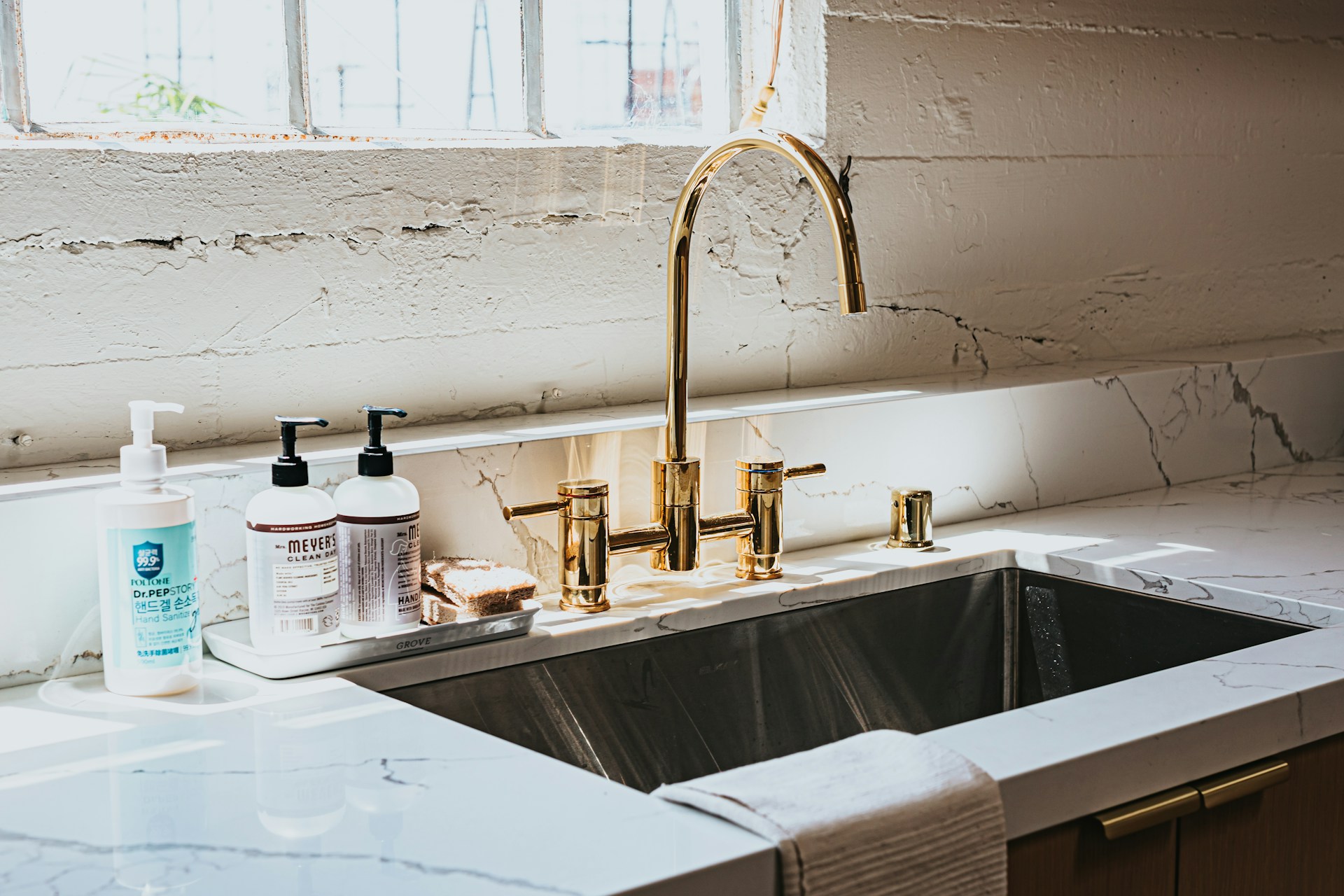A sink that keeps clogging can be more than just a minor inconvenience. Even if messy or backed-up water clears after using store products or plunging, if the clog comes back again and again, something deeper might be going on behind the scenes in your plumbing system. Most homeowners in Ardmore expect their sinks to just work—until they don’t. When that happens more frequently than it should, it’s worth asking why.
Persistent clogs are not always caused by what goes down the drain. Sometimes they can point to bigger problems within your plumbing system. Hidden issues like damaged pipes, poor pipe layout, or long-term buildup can go undetected until something like a clogged sink starts causing regular disruptions. If these symptoms are ignored, what feels like a simple kitchen issue could lead to costly repairs later. Let’s take a closer look at what your clogged sink might be telling you.
Common Causes Behind Persistent Sink Clogs
Nobody wants to stand over a sink filled with dirty, slow-moving water. Yet that’s exactly what happens when materials build up over time or when your plumbing system isn’t working as efficiently as it should. Understanding what causes these persistent blockages can help you identify where the real problem might be coming from.
Here are a few of the most common culprits:
– Grease and food waste: Washing grease down the drain may seem convenient, but as it cools, it sticks to the inner walls of your drainpipes. Add in crumbs, coffee grounds, and other debris, and it forms thick buildup that won’t go away easily.
– Hair and soap scum: This is more common in bathroom sinks, but kitchen sinks can also suffer if hair from brushing or shaving ends up getting washed down. Add soap residue to the mix, and blockages can form quickly.
– Damaged or aging pipes: Over time, pipes can corrode, crack, or collapse slightly, narrowing the pipe’s internal diameter. This means even small amounts of waste can easily cause a blockage.
– Poor pipe installation: If your plumbing wasn’t designed with the correct angles or pipe sizes, waste may have difficulty traveling smoothly through the system. Pipes that aren’t sloped properly can cause water and solids to pool in places they shouldn’t.
One example you might be familiar with is a kitchen sink that clogs up every few weeks even though you’re not misusing it. You may be rinsing your plates, running the garbage disposal, and using drain cleaner, yet the clog keeps coming back. That could mean the problem isn’t what’s going into the drain—it’s something happening further down the line.
In cases like this, simple fixes often won’t work. A bigger problem may be forcing those frequent clogs. Pipe wear and tear or faulty installations are harder to spot unless professionals inspect them with the right equipment. Ignoring these signs can let a minor clog grow into a major system failure. Identifying the cause early is the safest way to prevent serious plumbing damage.
When Clogs Mean There’s a Bigger Plumbing Issue
It’s easy to assume all clogs are alike, but that’s rarely true when they keep happening. Sometimes, a clog is actually a symptom of a larger issue, and knowing how to tell the difference can save you from a future emergency.
Here are a few warning signs that your clogged sink may be part of a more serious plumbing system problem:
– More than one drain is slow or clogged: If you have trouble with your kitchen sink, and then your bathroom starts acting up too, the issue might be in the main drain line rather than just a local pipe.
– Water drains very slowly: A slow-moving drain might mean there’s not a total blockage yet, but something deeper inside the pipe is starting to narrow the passage.
– Strange smells: If you start noticing sewer odors coming from your sink, that may indicate waste or gases are backing up through the pipes, potentially due to a blockage or venting problem.
– Odd sounds from the pipes or sink: Gurgling or bubbling sounds after using the faucet can point to trapped air caused by partial blockages or improper venting.
When these signs are present, continuing to treat them as isolated clogs might just be delaying a more serious plumbing situation. Letting a small warning snowball into a backup of wastewater or pipe break puts your home at risk.
Identifying the source early might mean the difference between a regular service visit and a full pipe replacement. It’s always a good idea to call for a deeper inspection when symptoms start to stack up. Our professionals use inspection tools and experience to trace problems to their roots, fix them properly, and prevent long-term damage.
Why Professional Help Is Crucial for Recurring Sink Clogs
If you’ve tried clearing a clogged sink multiple times and it’s still backing up, a deeper issue might be causing the problem. Store-bought cleaners and plungers only reach as far as the eye can see. Beyond the bend in your pipes, there could be buildup or malfunction that needs attention from someone with the right tools and training.
Our professionals can do more than just clear the immediate blockage. They assess the condition of the entire drain system. If there’s corrosion, pipe misalignment, or issues with venting, that’s something they can spot right away. Clearing the clog without addressing why it keeps happening just resets the timer until the next backup.
There’s also the risk of doing more damage if a problem goes unchecked. Water sitting too long in your sink can cause deterioration, and repeated overflows might warp your cabinets or flooring. Catching the problem early makes a huge difference, especially when you’re dealing with hidden issues under the surface. Our technicians have equipment like drain cameras and hydro-jetting tools that help identify clogs and fix them without tearing your home apart.
Getting the issue addressed by our professionals means you’re not guessing anymore. You’ll know whether a single drain needs attention or if there’s a bigger concern affecting your whole plumbing system. That kind of clarity can save time and prevent unnecessary repairs down the line.
Simple Tips to Prevent Future Sink Clogs
Once your sink drain is clear and everything is flowing again, it’s important to keep it that way. By taking a few basic steps, you can reduce the chance of facing another clogged sink in your Ardmore home.
You don’t need fancy tools or a long list of tasks. Just follow these habits:
– Don’t rinse grease or cooking oil down the sink. Wipe pans with a paper towel and throw it away instead.
– Run hot water down the drain for about 30 seconds after using the sink to help flush out debris.
– Use a sink strainer to catch food scraps and clean it regularly.
– Avoid stuffing large amounts of food into your garbage disposal at once.
– Don’t use your drain as a trash can. Things like dental floss, coffee grounds, eggshells, and starchy foods like pasta can cause buildup.
Even with good habits, pipes get older, and buildup can happen over time. That’s where investing in routine maintenance from our technicians can help. Regular inspections can catch small issues before they turn into big headaches. A technician may notice that a section of pipe isn’t flowing properly or that buildup is beginning to restrict flow—things that aren’t immediately visible but could lead to your sink clogging again.
With scheduled visits, your plumbing gets the attention it needs, not just when there’s an emergency. You’ll have peace of mind knowing your drains are taken care of and less likely to surprise you with problems.
Protect Your Plumbing from Long-Term Damage
A clogged sink in Ardmore doesn’t always seem like a big deal. But when it keeps happening or affects more than one area in the house, it’s usually a sign of something more serious. Ignoring a recurring clog doesn’t make it go away—it just gives it time to cause more damage. Drains that frequently back up put added pressure on your plumbing system and can lead to worse problems if left unchecked.
If your sink is clogged again, or your drains are draining slower than usual, don’t wait to see if it gets better. These signs often don’t improve on their own. Whether it’s buildup, collapse, or poor pipe layout, our professionals can identify what’s going wrong and offer the right fix. Acting early protects both your plumbing and your wallet.
Knowing the long-term condition of your plumbing system is just as important as fixing one clog. If your sink troubles are part of a larger issue, you’ll want experienced technicians to get to the root of it fast and keep your drains flowing the way they should. Field knowledge, proper equipment, and residential plumbing experience all come together to ensure problems are solved the right way.
For reliable help with a clogged sink in Ardmore and other plumbing concerns, trust Allied Services to protect your home with thorough and timely service that prevents further damage. Our professionals can quickly diagnose the underlying issues and offer effective solutions to keep your drains flowing freely. For a quick estimate or to book a service visit, please contact us today.


